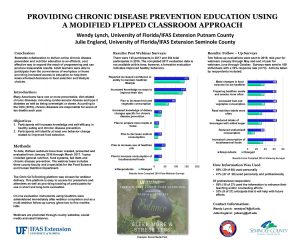Situation: Many Americans have one or more preventable, diet-related chronic diseases. Chronic diseases are responsible for seven of ten deaths each year (CDC, 2016). An Extension nutrition team developed a series of webinars to address the need for an expanded reach of chronic disease prevention and nutrition education while limiting the barriers of time, money, and travel for adult participants. Objectives: Participants will: 1. increase knowledge and self-efficacy in healthy eating and chronic disease prevention. 2. identify at least one behavior change related to improved food choices. Methods: A series of chronic disease prevention webinars were presented to the target audience. To date, thirteen webinars have been delivered monthly from January 2016 through March 2017. Results: The webinars were evaluated using an online, post-webinar survey; A second, follow-up survey was also given two to five months later. There were 146 participants in 2017 and 254 total participants in 2016. The completed 2017 evaluation data is not available at this time; however, a formative evaluation indicates improved healthy behaviors. The 2016 post program evaluation data reflected a 64% participation in the post-webinar surveys. 90% of the 147 respondents increased knowledge on ways to improve their diet. Other results included: 94% (33 of 35 respondents) increased knowledge of dietary changes specific for chronic disease prevention, 69% (68 of 99) plan to increase fruit and vegetable consumption and 87% (141 of 162) reported increased confidence in ability to maintain healthier lifestyle. Conclusion: Statewide collaboration to deliver online chronic disease prevention and nutrition education is an efficient, cost effective way to expand the reach of programming and can produce measurable results. Adult learners were able to participate from the convenience of workplace or home providing increased access to education to help them make informed decisions in food selection and lifestyle choices.
 0
0

